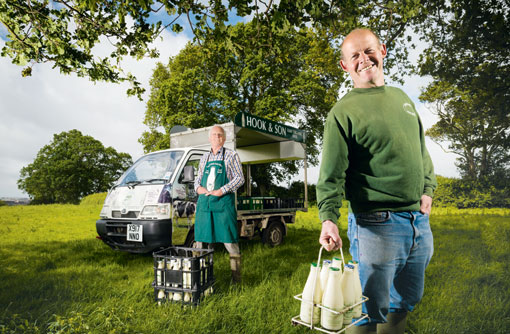Dairy Farmer Award shortlist: Phil and Steve Hook

When the judging panel met this year’s Dairy Farmer of the Year finalists at the start of June, innovation, drive, passion and a love of cows defined each of them. And those qualities still shine through despite the fallout from recent milk price cuts. Gemma Mackenzie reports on the farmers whose excellence and diversity epitomises the spirit of the British dairy industry
Phil and Steve Hook
Langleys Farm, East Sussex
Finding a niche market and commanding up to £2 a pint for a product that customers can’t get enough of is what makes Phil and Steve Hook’s organic raw milk business a shining example of an added-value enterprise.
From selling 18 pints out of the boot of their old Volvo on Eastbourne seafront, the father and son duo have come on in leaps and bounds. The business now churns out just under 5,000 pints a week to customers via its two local milk rounds, London markets and highly successful internet mail order service, which started in 2010. Now more than 300 boxes of milk are dispatched every week to customers as far afield as Northern Ireland and Scotland.
And so unique is this type of enterprise – there are fewer than 100 farms selling raw milk in the UK – that a pair of independent movie-makers has just finished a fly-on-the-wall documentary of a year on the Hooks’ farm. The Moo Man will be screened at 50 independent cinemas up and down the country later this year.
However, it hasn’t always been plain sailing for the family, whose vision to sell raw milk has meant strict compliance with FSA and EU regulations resulting in many hurdles along the way. In fact, a popular vending machine in Selfridges, London, selling raw milk from the farm has been removed while authorities ascertain the legality of selling raw milk through a franchise.
To ensure the milk is fit for consumption, regular bacteria testing is done throughout the supply chain and a hygiene consultant comes and trains all the staff once a year. And to aid other farmers considering going down the same route, Steve is involved in developing a raw milk processing code of practice with Dairy UK.
Despite these challenges, the family has persevered and worked to understand their end customer and command a high price for their product with a profit of more than 7p/litre before drawings – they cannot keep up with demand for 250g blocks of unpasteurised butter, which sell out swiftly at London markets for £4 a piece.
Part of this work has involved a strong marketing strategy, with every milk bottle depicting a cow in the herd and a story about her life; customers are also sent weekly newsletters about the farm.
However, there would be no milk to sell without the cows, and cow management is based around making the most from forage, with the herd of 65 cows being milked twice a day and grazed outside in the summer.
This has proved to be a difficult task as much of the farm is on marshy ground – an area of the farm is a designated RAMSAR site, meaning it is an area of wetlands of international importance – which affects silage cutting of the red and white clover leys and lucerne crop.
There is a strong focus on longevity in the herd – the average age of the cows is between nine and 10 – and the family plan to screen cattle for the A2 gene, and then breed from these cows so they can meet customer demand for milk suitable for lactose-intolerant people.
The family farm is also a key player in the community, employing 15 staff and hosting visits from local school children, who Steve describes as “future customers”. Phil was also instrumental in saving Hailsham Market, which is used by nearly 200 farmers in the area.
In the future, the family plans to build new cattle housing and a milking parlour with a viewing platform so customers and local school children can see the whole process from cow to pint bottle.
Steve says: “I’d love to have a set-up where people come on to the farm and they can safely see the cows in their houses and then the milking and the bottling stage.”
A word from our sponsors
 DairyCo is delighted to be able to sponsor this award once again. This is a great opportunity for dairy farmers to show they are proud of what they do and get the recognition they deserve for investing in their future and the future of dairy farming.”
DairyCo is delighted to be able to sponsor this award once again. This is a great opportunity for dairy farmers to show they are proud of what they do and get the recognition they deserve for investing in their future and the future of dairy farming.”
Hugh Black, DairyCo
See more
Meet the other 2012 finalistsFind out more about the 2012 Farmers Weekly Awards including details on how to books tables for the event’s glittering London awards bash
